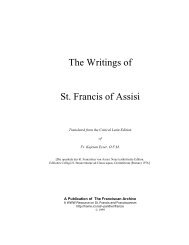the history of heresies, and their refutation - Catholic Apologetics ...
the history of heresies, and their refutation - Catholic Apologetics ...
the history of heresies, and their refutation - Catholic Apologetics ...
You also want an ePaper? Increase the reach of your titles
YUMPU automatically turns print PDFs into web optimized ePapers that Google loves.
embrace it, as he dreaded <strong>the</strong> vengeance <strong>of</strong> his people. Fleury, never<strong>the</strong>less, quotes many authorities to<br />
prove that Leovigild spent a week before his death, deploring <strong>the</strong> crimes he committed, <strong>and</strong> that he died<br />
a <strong>Catholic</strong> in <strong>the</strong> year 587, <strong>the</strong> eighteenth <strong>of</strong> his reign. He left <strong>the</strong> kingdom to his son Reccarede, who<br />
became a <strong>Catholic</strong>, <strong>and</strong> received <strong>the</strong> sacrament <strong>of</strong> Confirmation in <strong>the</strong> <strong>Catholic</strong> church; <strong>and</strong> such was his<br />
zeal for <strong>the</strong> faith, that he induced <strong>the</strong> Arian bishops, <strong>and</strong> <strong>the</strong> whole nation <strong>of</strong> <strong>the</strong> Visigoths, to embrace it,<br />
<strong>and</strong> deposed from his employment, <strong>and</strong> cashiered from his army, all heretics. The beginning <strong>of</strong> his reign<br />
was thus <strong>the</strong> end <strong>of</strong> <strong>the</strong> Arian heresy in Spain, where it reigned from <strong>the</strong> conquest <strong>of</strong> that country by <strong>the</strong><br />
barbarians, an hundred <strong>and</strong> eighty years before, in <strong>the</strong> beginning <strong>of</strong> <strong>the</strong> fifth century; <strong>and</strong> when <strong>the</strong><br />
Emperor Justinian, by <strong>the</strong> victories <strong>of</strong> Belisarius, became master <strong>of</strong> Africa, about <strong>the</strong> year 535 (chap. 4, No.<br />
64), <strong>the</strong> <strong>Catholic</strong> faith was also re-established. The Burgundians, in Gaul, forsook <strong>the</strong> Arian heresy under<br />
<strong>the</strong> reign <strong>of</strong> Sigismund, <strong>the</strong> son <strong>and</strong> successor <strong>of</strong> King Gontab<strong>and</strong>, who died in 516. Sigismund was<br />
converted to <strong>the</strong> faith in 515, by St. Avitus, Bishop <strong>of</strong> Vienne. The Lombards in Italy ab<strong>and</strong>oned Arianism,<br />
<strong>and</strong> embraced <strong>the</strong> <strong>Catholic</strong> faith under <strong>the</strong>ir King, Bimbert, in 660, <strong>and</strong> have since remained faithful to <strong>the</strong><br />
Church. Danæus thus concludes his essay on <strong>the</strong> heresy <strong>of</strong> <strong>the</strong> Arians : " This dreadful hydra, <strong>the</strong> fruitful<br />
parent <strong>of</strong> so many evils, was <strong>the</strong>n extinguished, but after <strong>the</strong> lapse <strong>of</strong> about nine hundred years, in about<br />
<strong>the</strong> year 1530, was again revived in Pol<strong>and</strong> <strong>and</strong> Transylvania, by modern Arians <strong>and</strong> Antitrinitarians,<br />
who, falling from bad to worse, have become far worse than <strong>the</strong> ancient Arians, <strong>and</strong> are confounded with<br />
Deists <strong>and</strong> Socinians "(11).<br />
<br />
ARTICLE III. 69-74. - Heresy <strong>of</strong> Macedonius. 75 - 77. -Of Apollinaris. 78. -Of Elvidius. 79.-Of Aetius.<br />
80, 81. -The Messalians. 82.-The Priscillianists. 83.- Jovinians. 84.-O<strong>the</strong>r Heretics. 85.-Of Audeus, in<br />
particular.<br />
<br />
69. As Arius uttered blasphemies against <strong>the</strong> Son, so Macedonius had <strong>the</strong> temerity to speak<br />
blasphemously <strong>of</strong> <strong>the</strong> Holy Ghost. He was, at first, an Arian, <strong>and</strong> was deputed to <strong>the</strong> Council or Cabal <strong>of</strong><br />
Tyre, as legate <strong>of</strong> <strong>the</strong> Emperor Constantius. He was <strong>the</strong>n intruded by <strong>the</strong> Arians into <strong>the</strong> see <strong>of</strong><br />
Constantinople, as Socrates informs us, though Paul, <strong>the</strong> lawful bishop, was <strong>the</strong>n alive, <strong>and</strong> he received<br />
ordination at <strong>the</strong> h<strong>and</strong>s <strong>of</strong> <strong>the</strong> Arians. A horrible circumstance occurred at his induction into <strong>the</strong><br />
Metropolitan see. He went to take possession in a splendid chariot, accompanied, not by his clergy, but<br />
with <strong>the</strong> imperial Prefect by his side, <strong>and</strong> surrounded by a powerful body <strong>of</strong> armed troops, to strike terror<br />
into <strong>the</strong> people. An immense multitude was assembled, out <strong>of</strong> curiosity to see <strong>the</strong> pageant, <strong>and</strong> <strong>the</strong><br />
throng was so great, that <strong>the</strong> church, streets, <strong>and</strong> squares were all choked up, <strong>and</strong> <strong>the</strong> new bishop could<br />
not proceed.<br />
(11) Fleury, t. 5; Gregor. Jur. 9, t. 15; Danes, Gen. Temp. not. p. 237.<br />
<br />
The soldiers set about clearing <strong>the</strong> way; <strong>the</strong>y first struck <strong>the</strong> people with <strong>the</strong> shafts <strong>of</strong> <strong>the</strong>ir spears, <strong>and</strong><br />
whe<strong>the</strong>r it was by orders <strong>of</strong> <strong>the</strong> bishop, or through <strong>the</strong>ir own ferocity, <strong>the</strong>y soon began to wound <strong>and</strong> kill<br />
<strong>the</strong> people, <strong>and</strong> trampled on <strong>the</strong> slain <strong>and</strong> fallen; <strong>the</strong> consequence was, that three thous<strong>and</strong> one hundred<br />
<strong>and</strong> fifty dead bodies lay stretched in gore in <strong>the</strong> street; <strong>the</strong> bishop passed through, <strong>and</strong> as his entrance to<br />
<strong>the</strong> episcopal throne was marked by blood <strong>and</strong> slaughter, so his future government <strong>of</strong> <strong>the</strong> See was<br />
distinguished for vengeance <strong>and</strong> cruelty. In <strong>the</strong> first place, he began to persecute <strong>the</strong> friends <strong>of</strong> Paul, his<br />
competitor in <strong>the</strong> See; he caused some <strong>of</strong> <strong>the</strong>m to be publicly flogged, confiscated <strong>the</strong> property <strong>of</strong> o<strong>the</strong>rs,<br />
more he banished, <strong>and</strong> he marked his hatred <strong>of</strong> one in particular by causing him to be br<strong>and</strong>ed on <strong>the</strong><br />
forehead, to stamp him through life with a mark <strong>of</strong> infamy. Several authors even say that, after he had<br />
banished Paul from <strong>the</strong> See, he caused him to be strangled at Cucusus, <strong>the</strong> place <strong>of</strong> his exile (1).<br />
<br />
70. His rage was not alone directed against <strong>the</strong> friends <strong>of</strong> Paul, but against all who pr<strong>of</strong>essed <strong>the</strong> faith <strong>of</strong><br />
<strong>the</strong> Council <strong>of</strong> Nice; <strong>the</strong> wretch made use <strong>of</strong> atrocious torments to oblige <strong>the</strong>m to receive communion<br />
from him. He used, as Socrates informs us, to have <strong>the</strong>ir mouths forced open with a wooden tongs, <strong>and</strong><br />
<strong>the</strong> consecrated particle forced on <strong>the</strong>m, a punishment greater than death to <strong>the</strong> faithful. He used to take<br />
<strong>the</strong> children from <strong>the</strong>ir mo<strong>the</strong>rs, <strong>and</strong> have <strong>the</strong>m most cruelly flogged in <strong>the</strong>ir mo<strong>the</strong>rs presence; <strong>and</strong> <strong>the</strong><br />
mo<strong>the</strong>rs <strong>the</strong>mselves he used to torture by squeezing both <strong>the</strong>ir breasts under <strong>the</strong> lid <strong>of</strong> a heavy chest, <strong>and</strong><br />
<strong>the</strong>n caused <strong>the</strong>m to be cut <strong>of</strong>f with a sharp razor, or burned <strong>the</strong>m with red coals, or with red-hot balls,<br />
<strong>and</strong> left <strong>the</strong>m to die in prolonged tortures. As if it was not enough to torture <strong>and</strong> destroy <strong>the</strong> <strong>Catholic</strong>s<br />
<strong>the</strong>mselves in this manner, he vented his rage on <strong>the</strong>ir churches, which he destroyed to <strong>the</strong> very<br />
foundations, <strong>and</strong> <strong>the</strong>ir ruins he had scattered abroad.<br />
<br />
Page 46 <strong>of</strong> 352













